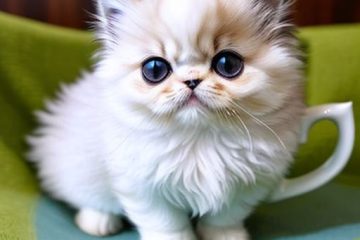Persian cats, with their luxurious coats and captivating looks, have long been adored by cat lovers around the world.
If you’re considering adding a Persian cat to your family, it’s important to weigh the pros and cons to ensure it’s the right fit for your lifestyle and preferences.
In this article, we will explore the pros and cons of owning a Persian cat, providing you with valuable insights to make an informed decision.
Pros of Owning a Persian Cat

1. Gorgeous Appearance and Graceful Demeanor
Persian cats are undeniably stunning with their long, flowing coats and expressive eyes.
Their elegant and graceful movements add to their overall charm, making them a delight to watch and admire.
2. Gentle and Calm Nature
Persian cats are renowned for their serene and gentle temperament.
They have a relaxed disposition and prefer a peaceful environment.
Their tranquil nature makes them wonderful companions for individuals or families seeking a serene and low-key pet.
3. Affectionate Companionship
Persian cats form strong bonds with their owners and thrive on human companionship.
They enjoy being in close proximity to their favorite humans, often seeking cuddles and gentle affection.
Their loving nature makes them excellent lap cats and provides a sense of warmth and comfort.
4. Low Exercise Requirements
If you prefer a cat that doesn’t require extensive exercise, a Persian cat may be a suitable choice.
While they enjoy interactive play sessions, they are not as energetic or demanding when it comes to physical activity compared to some other breeds.
You May Also Like: Training Your Persian Cat: Best Tips And Tricks
5. Well-Suited to Indoor Living
Persian cats are best suited for indoor living due to their long, flowing coats.
They are more sensitive to temperature extremes and outdoor hazards.
With a safe and stimulating indoor environment, Persian cats can thrive and lead contented lives.
6. Great for Apartment Living
Persian cats adapt well to apartment living, as their lower exercise needs and tranquil nature make them well-suited for smaller living spaces.
They can happily reside in apartments or homes without large yards.
7. Beautiful and Unique Aesthetics
The aesthetic appeal of Persian cats is hard to resist.
Their striking appearance and unique features, such as their round faces and expressive eyes, make them a favorite subject for photographers and artists alike.
8. Relatively Quiet
Persian cats are generally quiet cats, known for their soft and melodious voices.
If you prefer a peaceful and serene living environment, a Persian cat’s gentle vocalizations can be soothing rather than disruptive.
9. Good with Children and Other Pets
Persian cats are often patient and tolerant, making them a good choice for families with children or households with other pets.
They can coexist harmoniously and adapt well to the dynamics of a multi-pet household.
10. Long Lifespan
Persian cats are known to have a comparatively longer lifespan when compared to certain other cat breeds.
With proper care, they can live for 12 to 16 years or even longer, providing years of companionship and joy.
Cons of Owning a Persian Cat

1. High Grooming Requirements
One of the most significant considerations when owning a Persian cat is their grooming needs.
Their long, thick coats require daily brushing to prevent matting and tangling.
Regular grooming sessions can be time-consuming and may require additional maintenance to keep their coats in pristine condition.
2. Potential Health Issues
Persian cats are prone to certain health problems, including eye conditions, dental issues, and respiratory ailments.
They require regular veterinary check-ups and proactive care to monitor and manage their health effectively.
It’s essential to be prepared for potential medical expenses that may arise.
3. Risk of Heat Sensitivity
Due to their long fur, Persian cats can be more sensitive to heat and may struggle to regulate their body temperature effectively.
It’s crucial to provide them with a cool environment during hot weather and avoid exposing them to excessive heat.
4. Eye Staining
Persian cats are known for tear staining, which can cause the fur around their eyes to become discolored.
Regular cleaning and maintenance are necessary to minimize tear stains and keep their facial fur looking clean and healthy.
5. Potential Difficulty in Finding Reputable Breeders
Finding a reputable Persian cat breeder can be challenging.
It’s important to thoroughly research breeders, visit their cattery if possible, and ensure they prioritize the health and well-being of their cats.
Taking the time to find a responsible breeder is crucial to obtaining a healthy and well-socialized Persian cat.
6. Risk of Allergies
Persian cats, like other cat breeds, can trigger allergies in individuals who are sensitive to cat dander.
If you or someone in your household has allergies, it’s essential to spend time with Persian cats before making a decision to ensure compatibility.
7. Potential for Frequent Vet Visits
Persian cats may require more frequent veterinary visits compared to some other breeds.
Their predisposition to certain health issues necessitates proactive monitoring and early intervention when needed.
8. High Maintenance Eyes and Facial Care
The distinct facial structure of Persian cats, with their flat faces and shortened noses, requires regular cleaning and care. Their eyes can be prone to excessive tearing and require gentle cleaning to prevent irritation and infection.
9. Potential for Limited Availability
Persian cats may not be as readily available as some other cat breeds.
Their popularity and unique characteristics sometimes lead to limited availability, especially for specific coat colors or patterns.
Patience and persistence may be required to find the perfect Persian cat for your family.
10. Increased Risk of Kidney Disease
Persian cats have a higher predisposition to developing kidney disease compared to other breeds.
Maintaining a proper diet, providing fresh water, and regular veterinary check-ups are essential for early detection and management of kidney-related issues.
While Persian cats offer numerous advantages and are cherished by many, it’s crucial to consider the potential drawbacks and responsibilities associated with their care.
Assess your lifestyle, preferences, and commitment level before bringing a Persian cat into your home, ensuring a harmonious and fulfilling companionship for both you and your feline friend.
Conclusion
In conclusion, owning a Persian cat can be a rewarding experience for those who appreciate their exquisite beauty and gentle nature.
They make wonderful companions with their calm temperament and affectionate demeanor.
However, it’s important to consider the grooming demands, potential health issues, and specific needs associated with this breed.
By carefully weighing the pros and cons, you can determine if a Persian cat is the right fit for your lifestyle and commitment level.
With proper care, love, and attention, these majestic felines can bring years of joy and companionship to your home.


